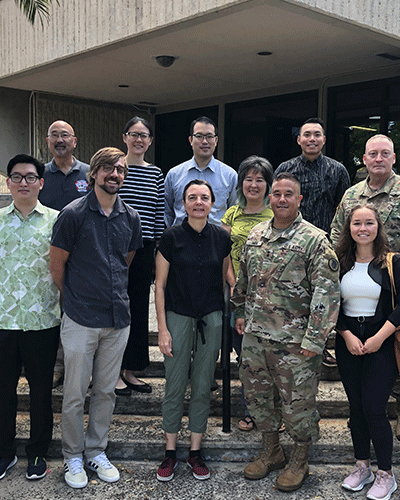The Hawaiʻi Pandemic Applied Modeling Work Group (HiPAM) was recognized by the Kauaʻi County Council for their “outstanding contributions to Kauaʻi and to the State of Hawaiʻi in addressing the formidable challenges poised by the COVID-19 pandemic.” HiPAM members included University of Hawaiʻi researchers and professionals in epidemiology, data science, healthcare and others who adapted tools that inform decision making and planning to help improve lives and public health in Hawaiʻi.
The certificate of honor stated, “The Kauaʻi County Council extends its sincere appreciation to HiPAM and its many volunteers who tirelessly work to provide much needed information specific to Hawaiʻi for the health and safety of our community.”
HiPAM members worked in a voluntary capacity using professional expertise to best help to minimize the disruptions and maximize the health and economic benefits of pending policy decisions. They developed models that assisted decision makers in understanding how different variables and indicators could potentially impact the spread of COVID-19 in a specific region of the state. The purpose of a model was to see how the variables might result in various outcomes based on certain policy frameworks.
“HiPAM members are grateful and honored for the council’s recognition of the value and importance of HiPAM. Our goal has always been to provide the most accurate information to the public and policymakers to make the best possible decisions,” said Victoria Fan, founder and chair of HiPAM, who has served as an associate professor of health policy in the UH Mānoa College of Social Sciences’ Social Science Research Institute.
Monique Chyba, HiPAM mathematician and professor of mathematics in the UH Mānoa College of Natural Sciences, added, “HiPAM demonstrated the best of how university partnerships can be relevant to the real world and innovative during a time of crisis.”
Although HIPAM’s models are meant to serve as one of many tools for decision makers, its models have been useful to Hawaiʻi because they captured local cluster data, risk of infection from incoming travelers, and demographic make-up, all of which are specific to the islands.
UH Mānoa College of Social Sciences’ Dean Denise Konan said, “The university is an amazing resource that, when harnessed skillfully, can provide and communicate valuable information in the service of the whole community.”
HiPAM, which closed in June 2022, was supported by several sources including the Hawaiʻi Data Collaborative, UH Mānoa Provost’s Office, National Science Foundation, Hawaiʻi Department of Health and the Hawaiʻi Department of Defense.
